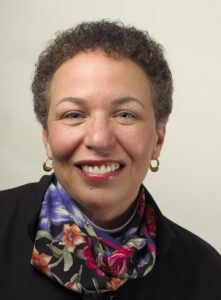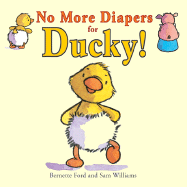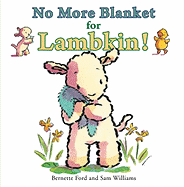 Even with more than a dozen books to her credit, Bernette Ford finds it tough to think of herself as an author. She’s an editor, a mentor, a wife, a mother. But an author? She doesn’t easily claim that title as her own.
Even with more than a dozen books to her credit, Bernette Ford finds it tough to think of herself as an author. She’s an editor, a mentor, a wife, a mother. But an author? She doesn’t easily claim that title as her own.
But that’s just how many children and parents around the world know her best. They see her name on books they purchase, check out in libraries, read over and over until they can recite her words by heart. To them, Ford is the creator of beloved titles such as First Snow (Holiday House, 2005), No More Diapers for Ducky! (Boxer Books, 2006) and Ballet Kitty (Boxer Books, 2007). To them, Ford is an author whose books speak to them in a special way.
Ford, a pioneering editor, has often paved the way. Her Just For You! series launched the careers of many children’s book creators of color. She’s building a new legacy as an author. Through her stories, she’s helping children embrace early transitions, explore their trials and successes and celebrate their desire to dance and dream.
Please tell us how your childhood influenced your dreams for the future.
During much of my very early childhood, my mother was quite ill with lupus so I spent a lot of time lost in books in order to deal with my fears and loneliness and sadness. I was the child of an interracial couple (my mother was black; my father white) and although I was surrounded by a loving family, I was extremely shy and I found it hard to make friends. But I did find many friends in the pages of my books. Later, as school and home responsibilities ate up more and more of my reading time, I thought that my ideal life would be working at a job where I could read whenever I wanted to.
What inspired you to pursue a publishing career?
By the time I went to college I thought that I wanted to be a writer.
My English teachers encouraged me, and my first cousin (playwright, actor, and director, Douglas Turner Ward), who founded the Negro Ensemble Company in the middle 60s, did too. He tacked a review of a play of his that I had written in high school on the bulletin board at the St. Marks Theater in the East Village for everyone to see. He took an interest in my writing, and his pride gave me some confidence.
Working in publishing seemed a way to get a foot in the door. I had absolutely no idea what book publishing was all about, but I was lucky to land a job as an “editorial assistant in training” in the Random House “minorities recruitment program.” Working in the children’s division, I soon found out that I did not have my own stories I was burning to tell, but that I loved helping authors and artists make their stories the best they could be.
What led you to focus on books for the very young?
 I worked as an editorial assistant to four or five senior or executive editors, who each specialized in different age groups and genres. At that time, senior editors spent a lot of time training and mentoring the assistants, in addition to giving us projects of our own to edit, under their tutelage, when they felt we were ready. I found that I enjoyed the books for the very young best, and I eventually moved up in the department as the replacement for a picture book editor who left to have a baby.
I worked as an editorial assistant to four or five senior or executive editors, who each specialized in different age groups and genres. At that time, senior editors spent a lot of time training and mentoring the assistants, in addition to giving us projects of our own to edit, under their tutelage, when they felt we were ready. I found that I enjoyed the books for the very young best, and I eventually moved up in the department as the replacement for a picture book editor who left to have a baby.
You’ve held many trailblazing leadership positions including Editorial Director of Cartwheel Books — the preschool imprint you founded — and Vice President/Associate Publisher of Grosset & Dunlap/The Putnam Publishing Group — the first African American to be named vice president of a major children’s book publisher. What was the racial landscape of the children’s book industry like when you entered the field? What gains have you made you proud? What do you hope the future brings?
I stayed in mass-market publishing because I believed that all children should have books they could own; books of quality their parents could afford, not just library books or the beautiful jacketed trade books you might find in independent bookshops. I had taught myself how to read before kindergarten by reading Little Golden Books from the supermarket, and books my mother got for us at rummage sales and library sales.
At the time I started in the publishing business in 1972, you could count one hand the number of African Americans in children’s book publishing. There was very little place for black children’s books in that world, but consciousness was starting to be raised. I worked really hard, I was good at what I did, and my talent was recognized and nurtured. (I suspect the powers that be often forgot my race because I was so light-skinned.) I was promoted wherever I went, and I was recruited to each new company that I went to.
I owe a debt of gratitude to the late illustrator Tom Feelings, who was responsible for spearheading a workshop in Harlem for people of color in publishing—artists and authors, as well as editors and designers. Several of our members became well-known authors or illustrators, and I formed friendships there that continue today. I met my husband, illustrator George Ford, at the Black Creators for Children (which was what we eventually named ourselves). George had been a past president of the Council on Interracial Books for Children, which had started a contest to bring authors and illustrators of color to the attention of the editors and art directors in the “all white world of children’s books.” Things began to change. Just as my years in college were the “revolutionary years,” so too I feel I was privileged to witness a sea change in publishing. By the time I went to Scholastic, many companies had recruited “diversity managers” to work in their Human Resources departments, and Scholastic formed a Diversity Committee, on which I served for many years. While some gains were made in attracting young people of color to the business, the truth is, publishing is notoriously a low-paying industry, making it unattractive to candidates who aspire to well-paying jobs. And its ranks are mostly filled by people who got there because of the still exclusive, old-boys’ network. I am probably more proud of the young editors and designers I mentored who have gone on to have careers in publishing.
Following up on the success of No More Diapers for Ducky!, you released more great titles like No More Bottles for Bunny!, No More Pacifier for Piggy! and No More Blanket for Lambkin! What inspired those books? What feedback do you get from parents? Children? How does that make you feel?
 Parents and children really like the “No More” books, and that is very satisfying to me. Just a month ago, a friend sent me a tape of her two-year-old grandson, who loves the book, reciting Ducky by heart. It was so cute, and just hysterical. Nothing could make me happier! What makes those books work, I think, is that the animal children accomplish their little milestones all on their own. When we were trying to find a nursery school for our own two-year-old daughter, the director who told us not to worry about toilet training totally won us over. She said it never fails: The ones in diapers want to use the potty and wear “big kid underpants,” just like their friends who are already potty trained do! And she was right.
Parents and children really like the “No More” books, and that is very satisfying to me. Just a month ago, a friend sent me a tape of her two-year-old grandson, who loves the book, reciting Ducky by heart. It was so cute, and just hysterical. Nothing could make me happier! What makes those books work, I think, is that the animal children accomplish their little milestones all on their own. When we were trying to find a nursery school for our own two-year-old daughter, the director who told us not to worry about toilet training totally won us over. She said it never fails: The ones in diapers want to use the potty and wear “big kid underpants,” just like their friends who are already potty trained do! And she was right.
Some authors of color express frustration about the publishing industry locking them into a box of what they should write. You’ve written books that feature African-American characters and those that feature animals dealing with issues like potty training and pastimes like dance. How can others who want to write without limits find their way?
As an editor I can say with confidence that if an author writes a wonderful, unforgettable story, some editor out there will love it and want to publish it, whether it’s about a human child or a bunny-child! Most authors never even meet the editors they are writing for. So if it suits you to “reveal” your race in your cover letter, so be it. And if it has nothing to do with the story you are submitting, you can decide if you need to mention it. Many of the authors and illustrators of color that I worked with on the Just For You! series have created animal stories for me for other books that I have packaged. We all have to work, and no publisher has ever asked me about the race of an author of one of my animal books. On the other hand, when white writers ask me why they are discouraged from writing about black life and culture, or any other culture, I tell them I would prefer them to write from their own experience and their own point of view. I think it is nearly impossible to write believably about a culture you haven’t lived!

Respect for someone who has been part of this difficult business for so long! And here’s to someone who encourages others Black authors to write whatever they want, in whatever voices they want to use.